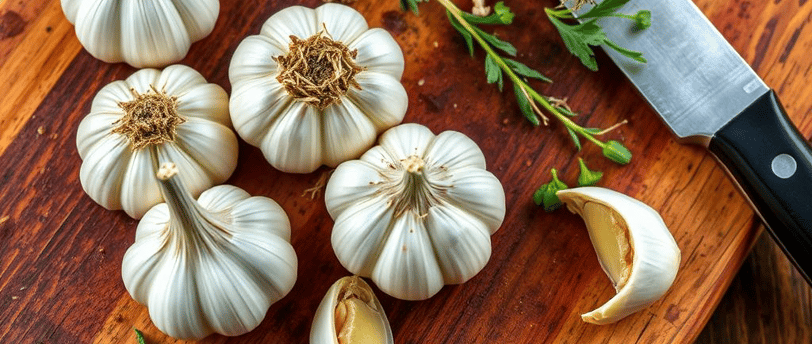Eat More Garlic: Nature’s Antibiotic for Superior Immune Defense
🧘WELLNESS TIPSIMMUNE SUPPORT & LONGEVITY


In the realm of natural foods, few ingredients boast as impressive a reputation as garlic. Revered not only for its robust flavor but also for its health benefits, garlic has been cultivated and utilized for centuries across various cultures. Known scientifically as Allium sativum, garlic is proudly deemed nature's antibiotic, playing a pivotal role in strengthening our immune defense. With an ever-growing body of research supporting its therapeutic properties, incorporating garlic into your diet could be one of the simplest yet most effective strategies for enhancing your health and resilience.
A Historical Perspective on Garlic
Garlic's usage dates back more than 5,000 years, with evidence suggesting that it was consumed in ancient Egypt, used by the Greeks to enhance athletic performance, and prescribed as a remedy in traditional Chinese medicine. Ancient texts from civilizations around the world have documented its medicinal properties, asserting its ability to tackle a wide range of ailments, from respiratory issues to cardiovascular diseases. This rich history sets the stage for understanding garlic's multifaceted benefits, particularly its role as an immune booster.
The Immune-Boosting Components of Garlic
The secret behind garlic's incredible health benefits lies in its bioactive compounds, primarily allicin, which is released when garlic is chopped, crushed, or chewed. Allicin possesses potent antimicrobial properties, allowing it to combat bacteria, viruses, and fungi. This activity makes garlic a formidable ally in supporting immune defense.
Antimicrobial Properties
Research has shown that garlic exhibits broad-spectrum antimicrobial activity. Studies have reported that garlic can help inhibit the growth of pathogens such as Salmonella, E. coli, and Candida, which is vital for maintaining a balanced gut microbiome. A healthy gut translates to a robust immune response, as approximately 70% of our immune system resides in the gut. By including garlic in your meals, you foster an environment wherein beneficial bacteria can flourish while combating harmful microorganisms.
Anti-Inflammatory Effects
Chronic inflammation is a significant contributor to the development of various diseases, including autoimmune disorders, heart disease, and cancer. The sulfur compounds in garlic, particularly diallyl disulfide, possess anti-inflammatory properties that can help modulate the immune system's response. This modulation not only promotes better immune function but also aids in reducing the risk of chronic diseases, making garlic an essential dietary component for health-conscious individuals.
Antioxidant Action
Free radicals are unstable molecules that can cause cellular damage and contribute to various diseases, including cancer and heart disease. Garlic is rich in antioxidants, which combat free radicals, thereby neutralizing their harmful effects. A strong antioxidant defense system is crucial for a healthy immune response, reinforcing the vital role garlic plays in dietary strategies aimed at improving overall health.
Garlic in the Kitchen: Culinary Uses and Preparation
Incorporating garlic into your diet is not only beneficial for your health but also elevates the flavor of various dishes. Here are some culinary uses and tips for maximizing garlic's health benefits:
Raw vs. Cooked Garlic
While cooking garlic can enhance its flavor, it can reduce the potency of some of its beneficial compounds. For maximum health benefits, consider consuming raw garlic. If cooking is preferred, try to chop or crush the garlic and allow it to sit for a few minutes before heating to enhance allicin production.
Diverse Incorporation
Garlic can be easily added to a variety of dishes. It works well in salad dressings, marinades, stir-fries, soups, and roasted vegetables. You can also create garlic-infused oils or use it as a flavorful addition to grains and legumes. The versatility of garlic makes it easy to enhance your meals while reaping its health benefits.
Supplements and Extracts
For those who may not enjoy the flavor or aroma of garlic, supplements in the form of garlic oil, aged garlic extract, or garlic tablets are available. However, it is essential to consult a healthcare professional before embarking on a supplementation regimen, as dosages and individual health needs can vary.
Addressing Potential Concerns
While garlic is generally considered safe for most people, it is essential to consume it in moderation. High doses of garlic may lead to digestive discomfort, heartburn, or allergic reactions in some individuals. Moreover, garlic can interact with certain medications, including blood thinners, making it critical to inform your healthcare provider about your garlic consumption habits.
Conclusion: A Simple Way to Boost Your Immune Defense
In a world that often buzzes with the latest health fads and supplements, garlic stands out as a time-tested natural remedy. Its potent antimicrobial, anti-inflammatory, and antioxidant properties make it a fantastic addition to anyone's health regime. By incorporating garlic into your meals, you not only enhance the taste of your cuisine but also fortify your body's defenses against illness and disease.
As we strive for better health in our modern lives, let us not overlook the simplicity and abundance of nature’s bounty. Eating more garlic can be one of the simplest lifestyle adjustments you make toward enhanced wellbeing. So, chop and crush that garlic bulb, relish its strong flavor, and take a proactive step in safeguarding your immune system—nature's antibiotic awaits you!
